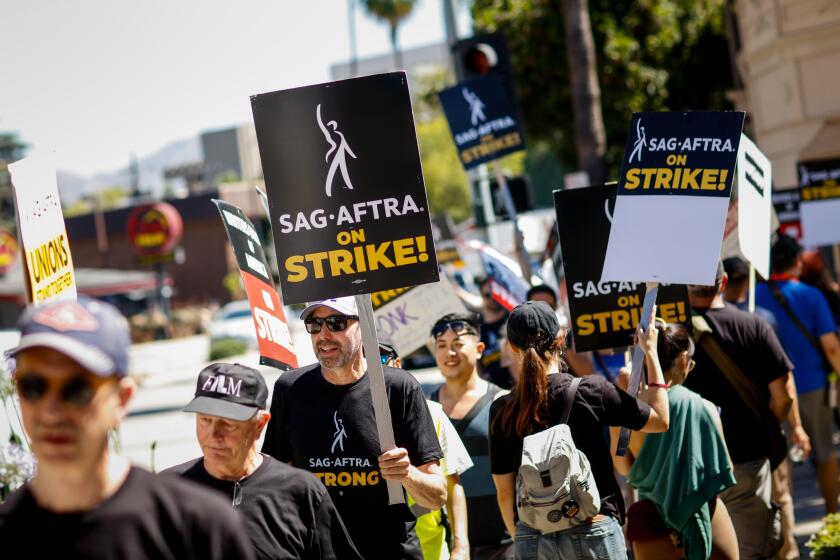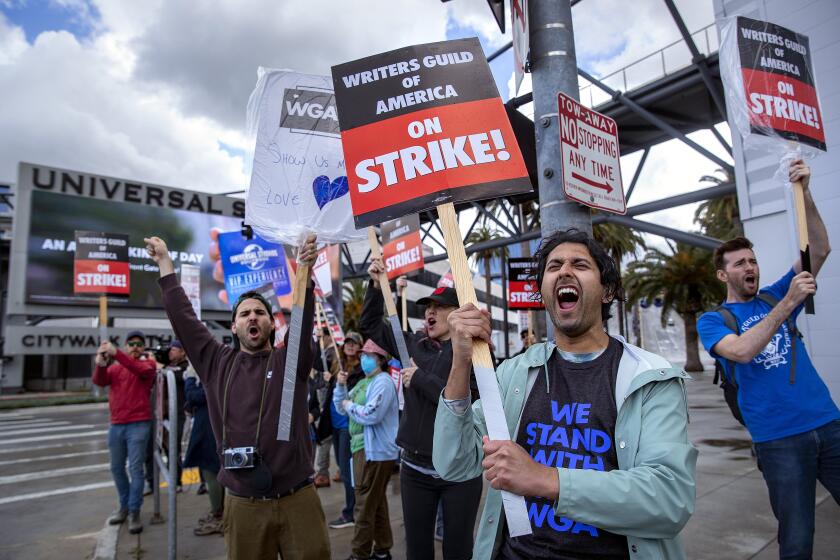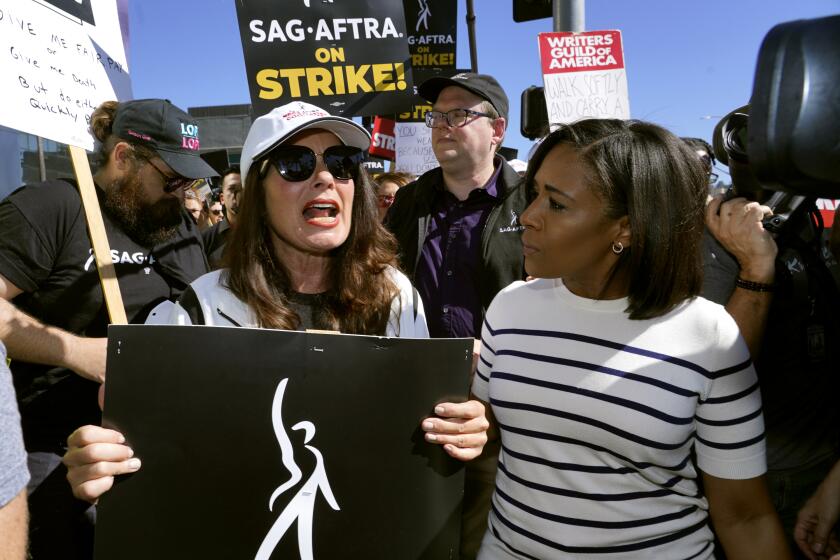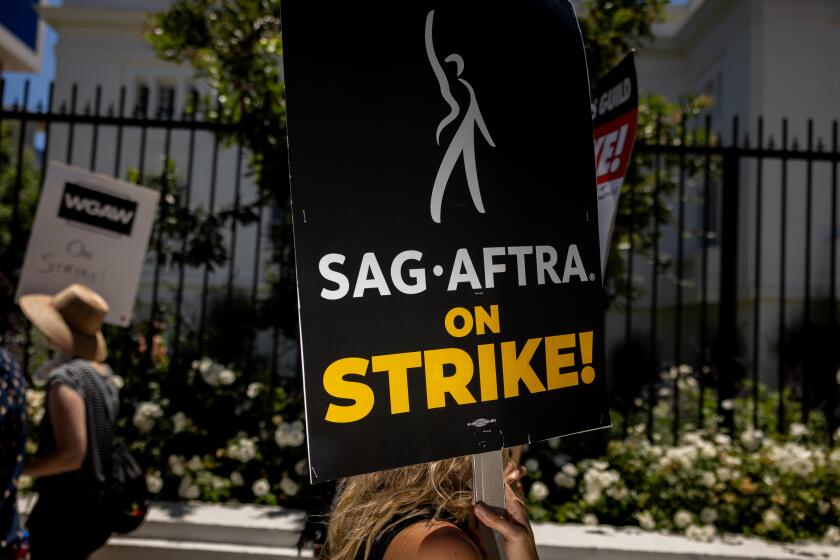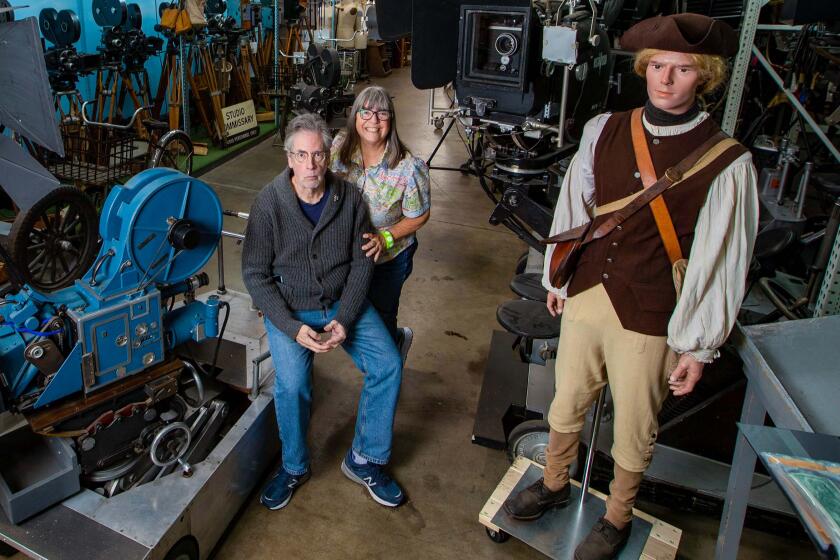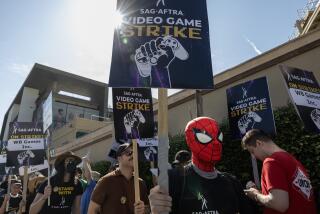Hollywood actors on strike, but many A-list celebrities still working. Inside side deals debate
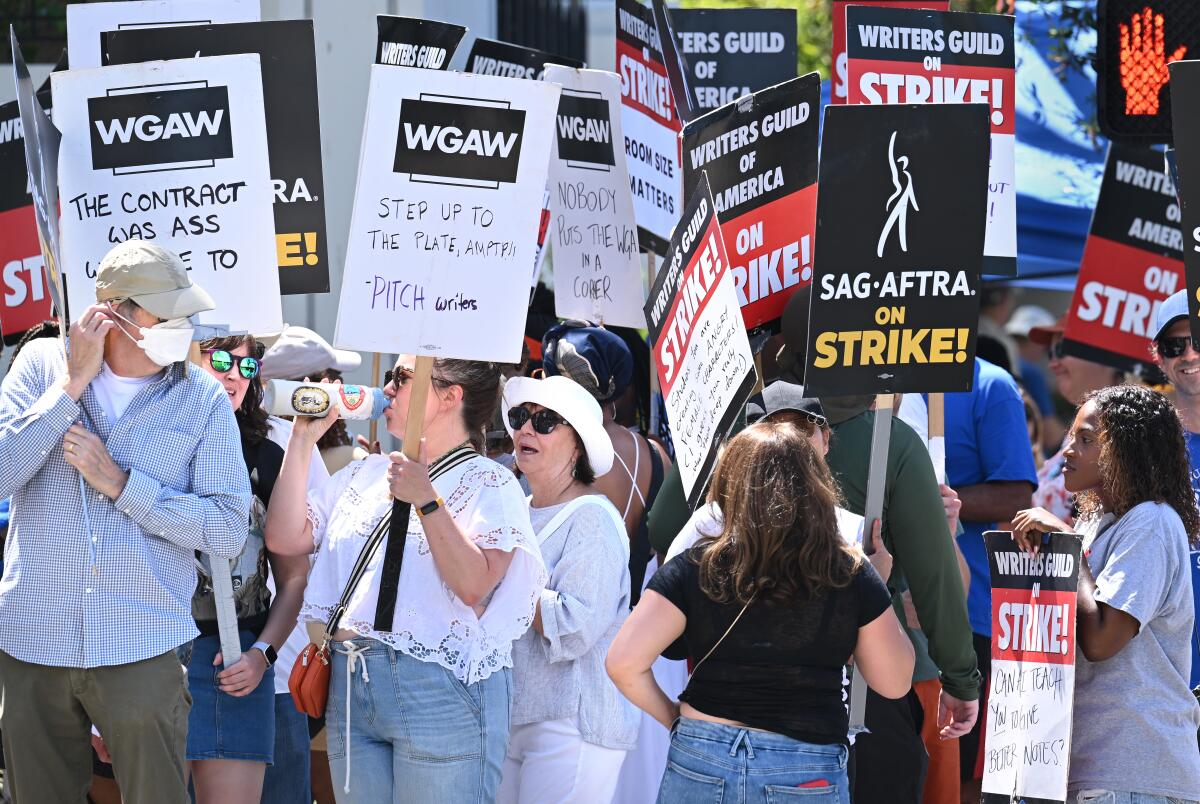
- Share via
Hollywood’s hot labor summer has brought near-historic solidarity among thousands of union members, who have banded together on sweaty picket lines around Los Angeles and New York.
That is until SAG-AFTRA began granting permission to independent film projects and series — some involving A-list stars including Anne Hathaway, Kevin Costner, Mel Gibson, Glenn Close and Dakota Fanning — to continue production despite the twin strikes that have crippled Hollywood.
Comedian Sarah Silverman led the attack against SAG-AFTRA’s interim agreements with film producers, calling out what she viewed as a “real stink of loophole-iness” that undercuts the work stoppage that began nearly three weeks ago, joining Writers Guild of America members who’ve been picketing since May 2.
“People are making real-deal sacrifices.... Writers, actors, crew people ... they’re sacrificing their livelihood for this cause,” Silverman said late last week on an Instagram video. “It’s called union strong — where we are all together.”
SAG-AFTRA has approved agreements with independent producers, allowing more than 110 independent film projects and series to move forward during the strike. But the action has created confusion, sparked allegations of favoritism and spurred a vigorous debate about whether the deals have helped or hindered the actors’ cause.
The actors are seeking increased minimum pay, a larger share of revenues from streaming shows and protections so that the use of artificial intelligence doesn’t wipe out work for background performers.
The drama heightened when Oscar-winning actor Viola Davis said she would no longer press ahead with her independent movie “G20,” which had received one of the interim agreements. The film, in which she portrays a U.S. president defending the world against terrorists, that was set to start filming in South Africa. Davis said recently “it would not be appropriate” to continue during the strike.
Viola Davis said that she does ‘not feel that it would be appropriate’ to film her movie ‘G20’ during the strike, despite having SAG-AFTRA’s blessing to do so.
SAG-AFTRA has defended the agreements, calling them a “vital part” of its strategic approach to the negotiations.
But entertainment attorney J. Christopher Hamilton called SAG-AFTRA’s decision to offer interim agreements “a really bad move.”
“The whole reason they can apply pressure to these organizations is the fact that there is a work stoppage,” said Hamilton, who also is an assistant professor at Syracuse University. “This guts some of the power that SAG-AFTRA was going to use as leverage.”
Some members of SAG-AFTRA, the Writers Guild of America and the below-the-line crew members’ International Alliance of Theatrical Stage Employees have openly questioned why they are jeopardizing their livelihoods when others, including many big-name stars, continue to work.
“We shouldn’t even have to debate this,” wrote actor Neil Hopkins in the comments on Silverman’s video. “We voted for a strike. We need to keep it real simple — a strike means a strike!”
As SAG-AFTRA members join writers on picket lines, the fallout will disrupt Hollywood film and TV productions worldwide. ‘There’s going to be blood in the water,’ said one analyst. ‘This will not end well.’
The WGA has refused to “allow writing to take place during the strike, whether that means a one-off deal with a small production company or a short-term deal” that would eventually be replaced when a new contract is reached, the guild said.
The Writers Guild of America said it will meet with the Alliance of Motion Picture and Television Producers on Friday to discuss resuming negotiations.
Following a boisterous rally outside Universal Studios with WGA and SAG-AFTRA members Tuesday morning, Joely Fisher, a prominent member of the SAG-AFTRA negotiating committee, told a Times reporter that the interim agreements were designed to demonstrate that the union’s demands weren’t that onerous.
Independent producers who applied for an interim agreement have agreed to accept SAG-AFTRA’s various deal points, including providing actors with an 11% boost in minimum pay, revenue sharing with performers for streaming shows and other concessions the Alliance of Motion Picture and Television Producers had rejected.
“If an independent company can make the deal — then so can the AMPTP,” Fisher said. “It really puts shame on them. It’s more leverage.”
Vincenza Blank, a SAG-AFTRA member standing nearby, wasn’t convinced.
Despite glimmers of internal dissension, SAG-AFTRA’s aggressive stance has, to the surprise of many, sent the studios to the relative ‘safety’ of the WGA.
“It feels like it’s the more elite people who are getting these chances,” Blank said. “It just muddies the water. We are fighting as a collective, and to have these productions going forward feels weird. More people should be encouraged to go out and picket.”
Fisher said SAG-AFTRA’s goal was to hurt AMPTP companies, but the guild also wanted to provide protections for SAG-AFTRA members who were working overseas — beyond the jurisdiction of the strike authorization.
The guild also hopes that the side agreements could help reenergize the independent movie business, which has taken a hit amid the shift toward streaming, media consolidation and the durability of big-budget theatrical franchise movies.
“This could be the rise or rebirth of truly independent filmmaking,” Fisher said.
SAG-AFTRA has approved a deal from the studios to end its historic strike. The actors were on strike for more than 100 days.
SAG-AFTRA has said that it has vetted the companies to make sure the films selected were not studio productions.
“If an independent feature or a series comes up with the money and the financing without using funds from an AMPTP company, then we want to allow that to go on,” Fisher said. “We want to get people back to work.”
Critics of the interim agreements program worry that these projects will help fill the pipelines for Netflix, Apple TV+ or Amazon Prime Video — the very companies the WGA and SAG-AFTRA have accused of disrupting the economics of the entertainment industry.
“We all know how this works: These movies and shows are going to end up on the same services that the guild is claiming that they want to disrupt,” Hamilton, the attorney said. “And contracts are designed to be modified, changed and amended. By the time these projects are acquired by third-party distributors, who are part of the alliance, the provisions will likely be watered down.”
As productions shut down due to the writers’ strike, local prop houses, florists and caterers worry about their future and loss of work, as their business costs continue to rise.
Davis’ movie, for example, is destined for Amazon Prime Video. It is co-produced by MRC, the studio behind the acclaimed TV series “Ozark” for Netflix, “Poker Face” for NBCUniversal’s Peacock and the Seth MacFarlane movie for Universal Pictures, “Ted.”
An Israeli spy thriller, “Tehran,” received an interim agreement. It reportedly had about a week’s worth of filming remaining on its third season, when SAG-AFTRA declared its strike. The show is scheduled to appear on Apple TV+, which is a member of the AMPTP.
A Civil War spy drama series, “The Gray House,” being produced by mega-stars Kevin Costner and Morgan Freeman also landed a side deal so that production could continue. Paramount Global, a member of the AMPTP, reportedly is providing international distribution.
Several of the companies receiving the interim deals are among the most successful production companies in Hollywood. The firm A24, which produced the Oscar-winning features “Everything Everywhere All at Once” and “Moonlight,” has two films that have received interim agreements — the pop-music drama “Mother Mary,” starring Hathaway, and the fantasy-adventure thriller “Death of a Unicorn,” featuring Paul Rudd and Jenna Ortega.
Hathaway and A24 declined to comment. Ortega and Rudd did not return a request for comment.
Another studio that is involved with productions that have received interim agreements is Santa Monica based Lionsgate, which is not a member of the AMPTP. Lionsgate is listed as a sales representative for the Mel Gibson-directed thriller “Flight Risk” starring Mark Wahlberg, according to IMDbPro.
The company has the distribution rights to the action-comedy movie “The Killer’s Game,” featuring Ice Cube, Dave Bautista and Ben Kingsley. It is also a distributor for the thriller “Anniversary.” Lionsgate declined to comment.
“It’s truly undercutting the strike,” Paul Scheer, an actor, writer and director wrote on Instagram under Silverman’s video.
Supporters of the interim agreements, however, say that they help provide financial support for crews who have been hurt by the shutdown in productions.
“It’s a good way to be able to continue projects and continue with work, so people can continue to get paid during this time for filmmakers that are willing to agree to the terms that the guild members need,” said Tiffany Boyle, president of sales and packaging at Ramo Law. “It is a way that helps both sides be able to come to a nice middle ground and be able to still make content and be able to still have jobs.”
Boyle has been advising people involved in projects who are interested in getting some SAG-AFTRA interim agreements. “Bride Hard,” a production starring Rebel Wilson, received one of the agreements and is listed as receiving legal services from Ramo Law on IMDbPro.
SAG-AFTRA’s strategy echoes what the WGA did in its fight to end packaging by talent agencies. WGA writers fired their agents in 2019 and then the union began making deals with individual talent agencies to end packaging, starting with smaller firms. That eventually resulted in the largest agencies reaching a deal with the union.
“This is exactly what the writers did — pluck them off one by one, until finally we’ve got so many small individual agencies on our side that the big ones have to cave,” said Stephen Galloway, dean of Chapman University’s Dodge College of Film and Media Arts. “If you’re fighting a territorial war, every yard you gain is moving forward.”
Andrea Schneider, director of the Kukin Program for Conflict Resolution at the Cardozo School of Law, said she recognized that SAG-AFTRA had a worthy rationale for making interim deals, including to stop the migration of productions overseas during the strike.
“They are also trying to demonstrate that there is a way for studios to make successful products even if they pay actors according to the wage structure that SAG has asked for and that the industry will not fall apart,” she said.
But there is a problem of optics, Schneider said.
“It’s the ‘we’re all in this together ... well, we’re not actually all in it together.’’’
Times staff writers Mark Olsen, Amy Kaufman and Christi Carras contributed to this report.
More to Read
Inside the business of entertainment
The Wide Shot brings you news, analysis and insights on everything from streaming wars to production — and what it all means for the future.
You may occasionally receive promotional content from the Los Angeles Times.

